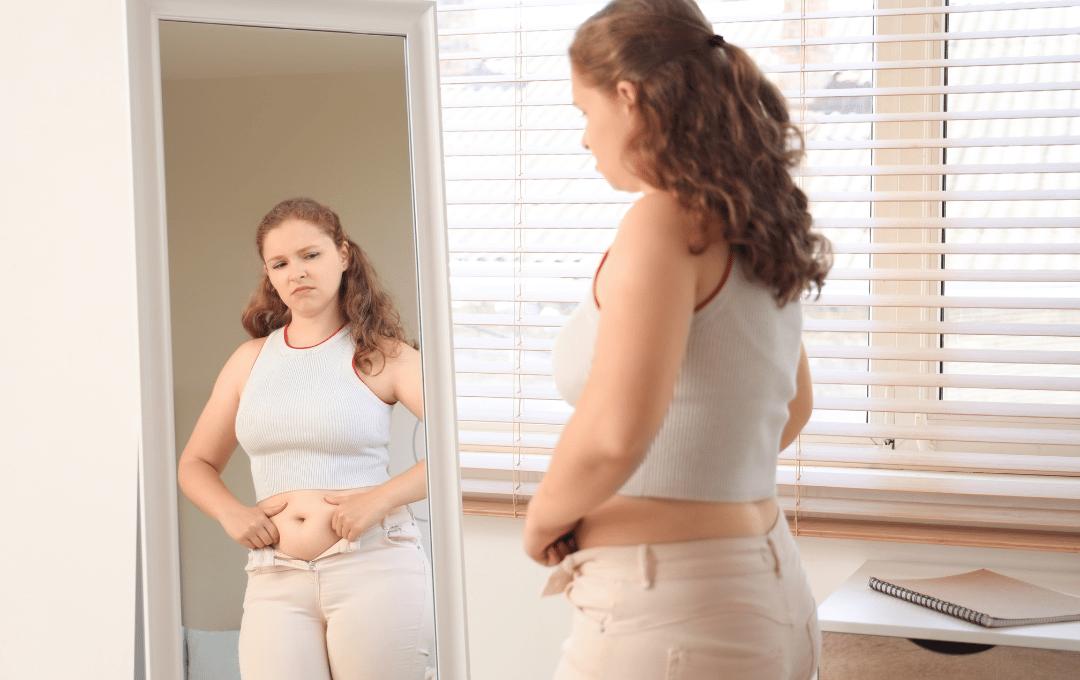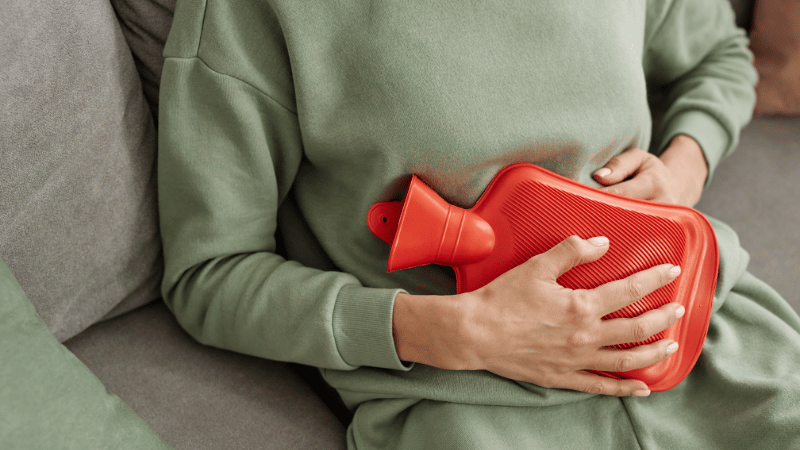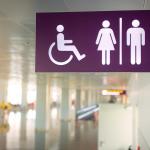
If you experience persistent bloating, one potential cause is uterine fibroids. While this condition is often associated with heavy periods and pelvic pain, bloating is a frequently overlooked early warning sign of fibroids.
Fibroid bloating occurs due to the size, location, and pressure fibroids place on nearby organs. Uterine fibroids can cause symptoms like stomach swelling and discomfort, depending on their growth. To manage fibroid bloating, it’s helpful to know why it occurs, how fibroids interact with nearby organs, and what solutions can help alleviate symptoms.
How Do Fibroids Cause Bloating?

Fibroids can cause abdominal swelling and a feeling of heaviness as they grow due to their size, location, and the hormonal imbalances they create. Understanding how fibroids impact the body can explain the reasons behind bloating and accompanying symptoms.
SCHEDULE AN APPOINTMENT ONLINE
Increased Uterine Size and Pressure on Organs
Since fibroids develop in or around the uterus, their growth can affect the uterus and surrounding organs. Large fibroids that press against the stomach, intestines, and bladder can lead to:
- Persistent abdominal swelling
- A bloated uterus
- Increased pressure on the stomach and bladder
- Feeling full after eating small amounts
- Discomfort when lying down
These symptoms can mimic common digestive issues, making it easy to overlook fibroids as a potential cause.
Fluid Retention
Fibroid-related hormonal imbalances can lead to fluid retention, making bloating more pronounced. Since fibroids are sensitive to estrogen, higher levels of this hormone can cause the body to retain more water and salt, resulting in puffiness and abdominal swelling. This effect can be especially noticeable during the menstrual cycle when estrogen levels peak, leading to increased bloating and discomfort.
Digestion Issues
Fibroids near the intestines or bowels can interfere with normal digestive processes, which worsens during your menstrual cycle. As these noncancerous tumors press against the digestive tract, they can slow down movement in the intestines, often causing constipation, gas buildup, cramping, and discomfort.
Since digestive issues like constipation and bloating are common, fibroids are often overlooked as a potential cause. However, if these symptoms persist despite dietary changes and over-the-counter remedies, they could indicate an underlying condition like fibroids.
If you are worried your symptoms may be related to fibroids, take our symptom quiz to learn more.
Is Fibroid Bloating the Same as a Stomach Bulge?
Fibroid bloating and stomach bulges may seem similar, but their development and persistence differ. Knowing the difference can help determine whether fibroids are causing abdominal swelling and if seeking medical advice is necessary.
Bloating vs. Stomach Bulge
A stomach bulge, or abdominal bulge, refers to a protrusion or swelling in the abdomen, which can be caused by various factors, including hernias, diastasis recti (separation of abdominal muscles), or digestive bloating.
While fibroids can make the abdomen swollen like a stomach bulge, they have distinct characteristics:
- If uterine fibroids are causing a bloated stomach, it tends to worsen before or during your period due to hormonal fluctuations.
- Fibroid bloating is more persistent, even when digestion is normal, whereas a stomach bulge is temporary. Large fibroids that push the abdomen outward create a firm, protruding appearance.
- The abdomen may feel firm or dense to the touch with fibroids, compared to the softer, more compressible feel of gas-related bloating.
- Fibroid bloating is often accompanied by additional symptoms, such as pelvic pressure, heavy periods, or frequent urination—symptoms not typically present with a standard stomach bulge.
If you’re experiencing consistent abdominal swelling along with other fibroid symptoms, schedule a consultation at USA Fibroid Centers. Our specialists can help you find the right option to relieve discomfort.
Signs That Fibroid Bloating May Be The Cause

Compared to digestive bloating, fibroid bloating often lasts longer and may be accompanied by other fibroid symptoms. If you’re experiencing persistent bloating, here are other signs that fibroids may be the cause:
- Stomach swelling or fullness: Regarding fibroids and a swollen stomach, persistent bloating results from symptoms like an enlarged uterus.
- Feeling of heaviness in the lower stomach: Many women report constant pressure, heaviness, or tightness in their abdomen, even when they aren’t on their period.
- Clothes fitting tighter around the waistline: If your clothes feel snug around your abdomen without significant weight gain, it may be fibroid bloating.
- Bloating that worsens before or during menstruation: Hormonal fluctuations can make fibroids swell temporarily, leading to increased bloating during certain times of the month.
Request a Consultation With a Fibroid Specialist
Does Fibroid Bloating Come and Go?
Although fibroid bloating tends to last over a longer period of time, it doesn’t always feel the same throughout the day. The intensity can vary, with some women experiencing fibroid bloating that becomes more or less pronounced at different hours. Understanding these fluctuations can help you better handle symptoms and recognize patterns.
Some fluctuations associated with fibroids and bloating include:
- Hormonal changes during the menstrual cycle.
- Fibroids can go through growth phases, leading to periods of worsening bloating and abdominal pressure.
- Many women find fibroid bloating less noticeable in the morning but worsening as the day progresses due to movement, digestion, and gravity.
Tracking your symptoms can determine any patterns and triggers for fibroid bloating.
How To Reduce Fibroid Bloating

While fibroid bloating is uncomfortable, specific lifestyle changes can manage symptoms and reduce abdominal swelling until proper treatment.
Dietary Adjustments
Making mindful dietary choices can reduce fluid retention and support better digestion. For example, excess salt causes water retention in the body, so opt for fresh, whole foods instead of processed or packaged items. Also, add fruits, vegetables, and whole grains to your diet to promote regular digestion and prevent constipation. Certain foods, like beans, cabbage, and carbonated drinks, can cause excess gas and bloating, so limiting these helps reduce discomfort.
Staying Hydrated
Staying hydrated regulates digestion, reduces constipation, and flushes out excess sodium. However, caffeine and alcohol can dehydrate the body, leading to water retention.
Exercise and Movement
Low-impact activities like walking and yoga can reduce abdominal pressure, promote digestion, and enhance blood flow. Pelvic floor exercises strengthen pelvic muscles to help alleviate discomfort caused by fibroids pressing on surrounding organs.
These changes can help manage fibroid bloating, but consult a fibroid specialist to determine the best long-term treatment options for severe and constant bloating.
Uterine Fibroid Embolization (UFE) for Fibroid Symptom Relief
Uterine fibroid embolization (UFE) is an effective non-surgical option for fibroids and bloating. This minimally invasive procedure cuts off the fibroid’s blood supply, causing the growths to shrink over time. As the fibroids shrink, they exert less pressure on surrounding organs, helping to alleviate symptoms like bloating, pelvic pressure, and digestive issues.
Some other advantages of UFE include:
- Less heavy bleeding and menstrual cramps
- No hospital stay is required
- Quick recovery time, typically within 1-2 weeks
- Long-term symptom relief
- Preserve fertility
If persistent bloating and other fibroid symptoms affect your life, consult a specialist to see if UFE is right for you.
Find Relief Today – Book Online
When To See a Doctor for Fibroid Bloating

Consult a fibroid specialist if you experience any of the following symptoms:
- Bloating that doesn’t go away
- Pelvic pressure, constipation, or urinary urgency
- A swollen stomach without weight gain
- Unusually heavy or prolonged periods
Visiting a fibroid specialist to learn more about non-surgical treatment options like uterine fibroid embolization can help you find fibroid bloating relief. Schedule an appointment at a USA Fibroid Center near you by calling 855.615.2555 or scheduling online.
Fibroids and Bloating FAQs
How can I tell if my bloating is from fibroids or digestion issues?
Fibroids and bloating often worsen around the menstrual cycle due to hormonal fluctuations, whereas digestive bloating typically lacks this pattern. Fibroids also put pressure on the lower abdomen, while digestive bloating is usually more generalized in the stomach area. Additionally, food choices trigger or relieve digestive bloating symptoms, whereas fibroid bloating persists despite diet changes.
What does fibroid bloating feel like?
Fibroid bloating is often a constant pressure or feeling of fullness in the lower abdomen. It can lead to a continuous stomach bulge, causing pelvic discomfort or pressure. The severity of the symptoms depends on the fibroid’s size and location, with larger fibroids more likely to cause symptoms.
How long does fibroid bloating last?
Fibroid bloating typically worsens right before a period due to hormonal fluctuations and subsides once menstruation begins. However, the severity and duration of bloating varies depending on the fibroid’s size, number, and location. While some women experience bloating that fluctuates with their cycle, others may have persistent bloating that causes a constant sensation of fullness in the lower abdomen.
Does fibroid bloating go away after treatment?
Treatment provides significant fibroid bloating relief, particularly procedures like uterine fibroid embolization. This treatment shrinks fibroids, reducing the pressure on the bladder and intestines, leading to less bloating and abdominal discomfort.



